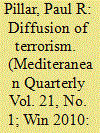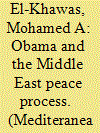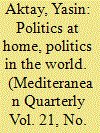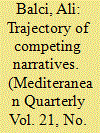| Srl | Item |
| 1 |
ID:
095176


|
|
|
|
|
| Publication |
2010.
|
| Summary/Abstract |
The prevailing perception of the threat from international terrorism is that it emanates chiefly from one group, al Qaeda, it is tied to a territorial presence in South Asia, and it is driven by a fixed ideology bent on inflicting maximum damage on the West. The perception stems more from Western fears and the legacy of past experience than from actual trends in terrorism. The real threat is more diffuse and decentralized, not embodied in any one group or piece of territory, and has more malleable goals and tactics.
|
|
|
|
|
|
|
|
|
|
|
|
|
|
|
|
| 2 |
ID:
095179


|
|
|
| 3 |
ID:
095181


|
|
|
|
|
| Publication |
2010.
|
| Summary/Abstract |
The author examines the steps taken by the new administration to resolve the decades-old Israeli-Palestinian conflict. The search for a solution requires dealing with many players with conflicting interests and contradictory agendas. President Obama's relaunch of the Middle East peace process soon ran into problems. His two-state solution was not endorsed by Israel's Prime Minister Benjamin Netanyahu until June 2009. President Obama's early call for a settlement freeze in the occupied territories was hailed by the Palestinians, but US envoy George Mitchell was able to get Netanyahu to agree only to a partial freeze, which was rejected by Palestinian Authority President Mahmoud Abbas. Obama's subsequent retreat on a settlement freeze shocked the Palestinians, who refused to start the peace talks.
|
|
|
|
|
|
|
|
|
|
|
|
|
|
|
|
| 4 |
ID:
095188


|
|
|
|
|
| Publication |
2010.
|
| Summary/Abstract |
This essay examines the domestic logic informing the creation of Bulgaria's foreign policy. It contextualizes inferences made from Bulgaria's diplomatic attempt to "play the EU" during the visit by the Bulgarian minister of foreign affairs to Central Asia in September 2007. Inferences of the national narratives of Bulgaria's international involvement are contextualized to suggest that domestically the Europeanization of Bulgarian foreign policy has been preoccupied with negotiating the conflict between state and nation. A report on Central Asia indicates that the logic of mythmaking informs the domestic articulation of the foreign policy stance coming from Sofia, Bulgaria's capital, not only toward neighboring countries (where it might be expected, as has been well documented) but also toward regions that are not geographically proximate. Inferences are contextualized by the national narratives of Bulgaria's international involvement. Such positions suggest that domestically the Europeanization of Bulgarian foreign policy has been preoccupied with negotiating conflict between state and nation.
|
|
|
|
|
|
|
|
|
|
|
|
|
|
|
|
| 5 |
ID:
095186


|
|
|
|
|
| Publication |
2010.
|
| Summary/Abstract |
The "political" has been absent from Turkish foreign policy because the main difficulties facing the country were considered almost constitutive elements of Turkish national existence, so that they are kept incurable. This essay includes a brief history of the absence of the political in Turkish foreign policy. Some conservative and dogmatic considerations of limits in political life have been typical obstacles to change. When politicians address the obstacles, they threaten many economic and political interests. A radically different, recent approach in Turkey promotes political action to achieve "zero problems with the neighbors." While we could previously see the removal of the political from foreign policy in Turkey, now we also can see the clear return of the political.
|
|
|
|
|
|
|
|
|
|
|
|
|
|
|
|
| 6 |
ID:
095187


|
|
|
|
|
| Publication |
2010.
|
| Summary/Abstract |
The history of the "deep state"-also known as Ergenekon-in Turkey starts with the foundation of the modern republic. Although references to the deep state date back to an earlier period, this essay examines coverage of it in the Turkish media during the late 1990s and the early-twenty-first century. Ergenekon was conceptualized, debated, defined, and redefined by the media; it was brought to public attention by the media, not by state officials, the police, politicians, inspectors, or members of the organization. The author's intent is not to redefine Ergenekon yet again but to analyze the meaning of the organization Ergenekon, how that meaning is continually defined and redefined by the media, and how the facts related to Ergenekon are interpreted by the media.
|
|
|
|
|
|
|
|
|
|
|
|
|
|
|
|
| 7 |
ID:
095184


|
|
|
|
|
| Publication |
2010.
|
| Summary/Abstract |
Greece's veto of the entry of the Former Yugoslav Republic of Macedonia (FYROM) into the North Atlantic Treaty Organization (NATO) in 2009 provides an opportunity to evaluate the possible costs and benefits of a FYROM membership. For NATO, FYROM's inclusion has only a marginal impact on the success of NATO's military missions. In fact, the inclusion of FYROM could mean more, not fewer, security challenges for the alliance. For FYROM, the benefits of NATO candidacy have not materialized. While its civil-military relations have improved, shortcomings still exist among FYROM's democratic and free-market institutions. Evaluating FYROM's case for membership results in a better understanding of the challenges and concerns related to continued eastward expansion.
|
|
|
|
|
|
|
|
|
|
|
|
|
|
|
|